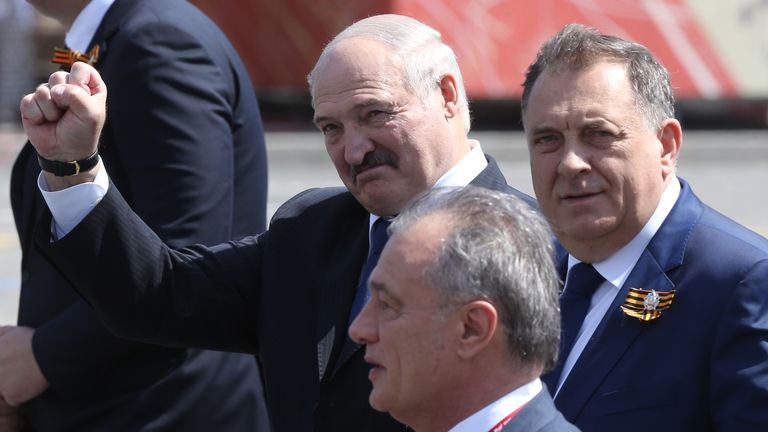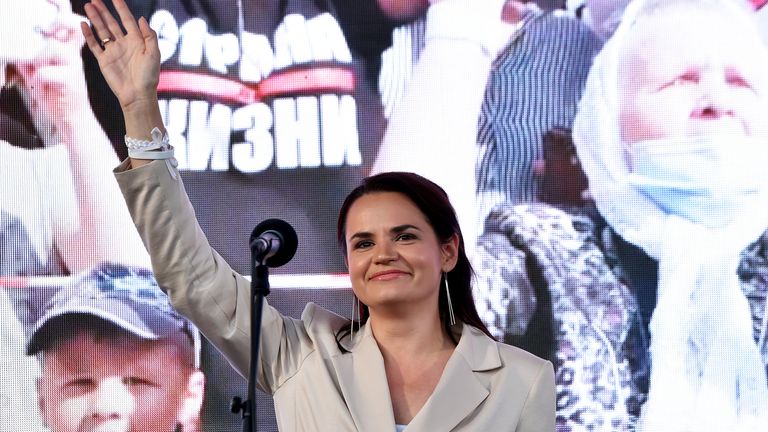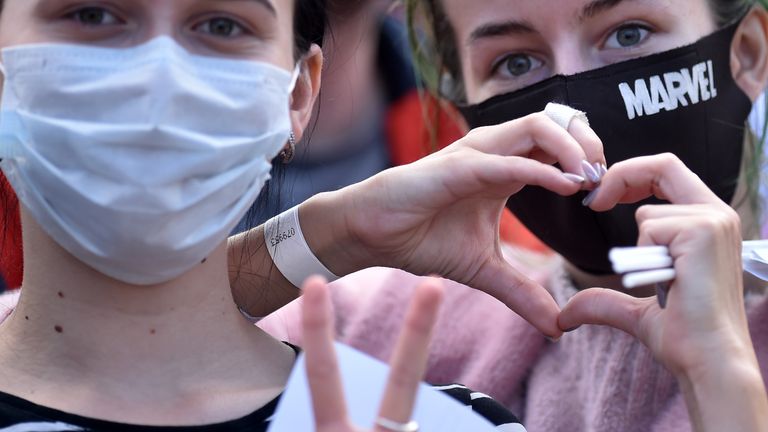This is not the election that the long-time leader of Belarus, Alexander Lukashenko, had planned.
The last five were not hard fought. No need when the entire apparatus of the state is busily engaged engineering a slam-dunk majority for the incumbent.
This Sunday was set to be one more token polling day that would see Mr Lukashenko coasting towards his third decade in power.
It has not turned out that way.
The remarkable charisma and campaign of his three female challengers may even mean this term turns out to be his last.
Svetlana Tikhanovskaya, Veronika Tsepkalo and Maria Kolesnikova are the wives and campaign manager of three presidential candidates barred from running.
They have taken on the mission their menfolk cannot, uniting their efforts behind Ms Tikhanovskaya, a 37-year-old mother and housewife, to rally the ever-growing opposition behind one voice.
Ms Tikhanovskaya’s husband, Sergei, is a popular YouTube blogger. Maria’s boss, Victor Babariko, is a banker. Both were jailed during the campaign.
Veronika’s husband, Valery, is a former ambassador to the US and key figure in the Belarusian IT sector.
He has had to flee to Moscow with the couple’s twin boys after they felt the state circling.
“When you receive information from two independent sources about plans to arrest you and to take your kids from you on the false charges that we were bad parents, we decided,” he told me as he took his sons to see the Kremlin for the first time.
The children of opposition candidates have been taken away before and put into state orphanages.
Ms Tikhanovskaya has also had to send her children to Europe to keep them safe.
Nothing is worth that risk.
Sky News was refused accreditation to cover the elections so we commissioned a film-maker inside Belarus to document the women’s campaign.
It is a fly-on-the-wall look at the spirit which drives them and which has so captured the hearts of their fellow countrymen.
“So many times in this campaign I was close to quitting,” Ms Tikhanovskaya told a crowd of tens of thousands in the city of Mogilev.
“I’m not a public person and I’m a weak person to face the actions of the government towards me as a mother and a wife.
“But just the belief that you people are together as a nation, you have helped me get through this.”
They have drawn crowds never before seen in post-Soviet Belarus: 60,000 in the capital Minsk last week, tens of thousands in each of the towns and cities they have toured.
It has been a gruelling schedule for political novices and the stress is clear to see.
But it is their emotional candour and resolve which has given hope to the millions in Belarus desperate for change.
“I am just the same, un self-confident person I was,” Ms Tikhanovskaya told Sky News.
“But this is my mission – I have to overcome all these difficulties and bring our country to a free future and become a mother and wife again.
“People say that usually women are weak. Maybe we are. But when there is need, when our duty calls us and we have to be strong, we are.”
Their agenda is simple: free the political prisoners and, if Ms Tikhanovskaya wins, hold free and fair elections within six months.
Since early May, the human rights group Viasna estimates about 1,300 people have been detained for protesting against the regime.
Scenes of entirely unjustified police brutality make it clear why Belarus still deserves the name Europe’s last dictatorship.
At a rally in the city of Babrysk, a schoolteacher gave her summary of what it is to live in Belarus.
She had spent a year and a half in detention on false charges, she said, but had no hesitation about speaking out.
“It’s a country of total deception. On TV they say one thing and in reality it’s different,” she said.
“In Babrysk all the factories stopped working, people have no money to live – the hunger will bring them to the streets.
“That’s how we live and we don’t want to live like this.”
COVID-19 has exacerbated the discontent.
Mr Lukashenko first denied its existence, advocating vodka and banyas (steam baths) as treatment while his people died, only to admit recently he’d had an asymptomatic case himself.
Civil society has stepped in where the state would not, delivering supplies to hospitals across the country. It has made people realise they can make a difference.
The president appears increasingly desperate.
In a strange incident last week, 33 alleged mercenaries from the Russian private military company Wagner were arrested in a sanatorium outside Minsk.
According to the Belarusian KGB, they had raised suspicions because they were not drinking alcohol as regular Russian tourists would.
Moscow says they were in transit. Mr Lukashenko claims they are part of a plot to foment a colour revolution in Minsk.
He told a Ukrainian journalist on Friday that he would take up arms against “hybrid aggression” if all other options were exhausted.
It is unlikely to come to that. Ms Tikhanovskaya’s team has no desire to provoke unrest.
Moscow has neither the will nor the wherewithal to involve themselves in a power grab in Minsk.
Mr Lukashenko’s imagination seems to be running wild as he realises his popular support has vanished.
But that does not mean a polling defeat. The members of local electoral committees across the country have jobs to keep and families to look after.
Reporting the true voting tally risks all that.
Furthermore, the elites are entrenched in Belarus. They will not allow for this election to end in anything other than a foregone conclusion even if the winds of change are beginning to blow.
The fairytale has a few more hours to run before polls close on Sunday evening.
The people of Belarus recognise there will be no happy ending this time round.
But they know too that something in the stagnant politics of the last two decades has shifted, thanks to three brave women who refuse to let an old school autocrat break their families or their country.







